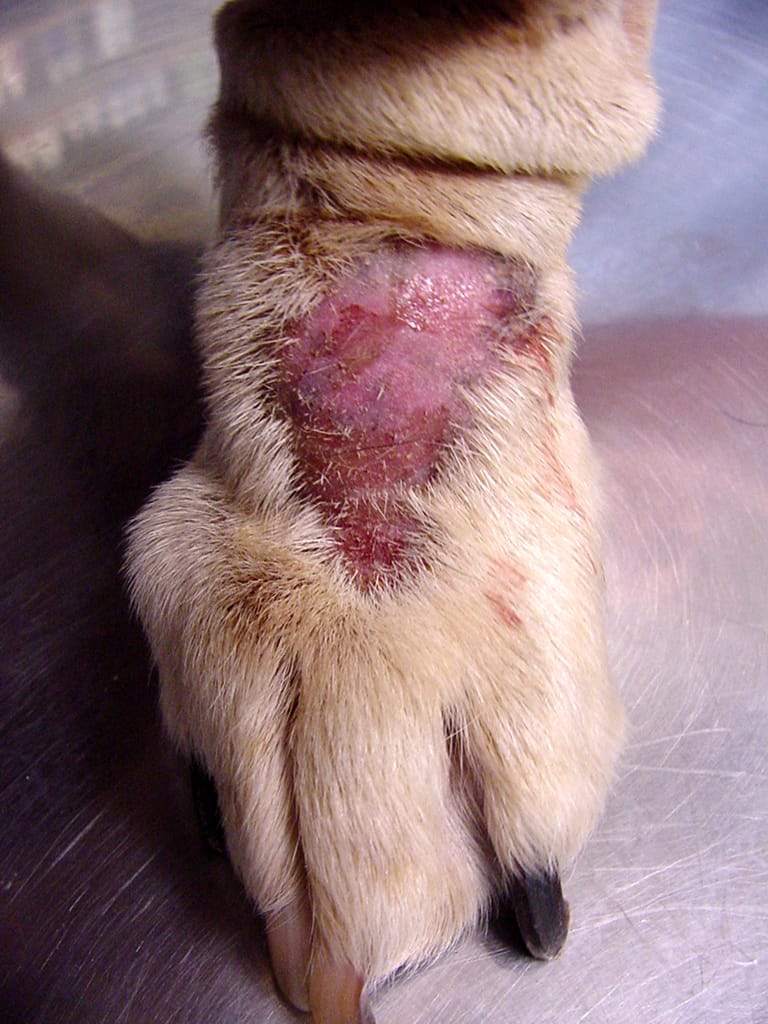Your dog might be licking and chewing their paws for a variety of reasons, ranging from simple cleanliness to more complex medical issues. While occasional paw licking is normal behavior for dogs, excessive licking and chewing can indicate an underlying problem that needs attention. Understanding the potential causes is the first step in helping your canine companion find relief.
Excessive paw licking and chewing can become a habit that leads to secondary problems like bacterial infections, known as pododermatitis, which can be painful and difficult to treat. Promptly addressing the root cause with your veterinarian is crucial to prevent complications and ensure your dog’s comfort and well-being.
Common Causes of Paw Licking and Chewing
Several factors can contribute to a dog’s excessive paw licking and chewing. These can include physical injuries, allergies, parasites, and even behavioral issues.
1. Injuries or General Pain
Physical injuries to the paws, such as cuts, scrapes, or embedded objects, can cause discomfort and lead to licking. Your dog might also be experiencing pain from other sources, such as an insect sting or a more generalized injury, which can manifest as excessive paw licking. Limping, decreased activity, or avoiding certain movements are other signs that may accompany pain. If you suspect an injury, it’s important to have your veterinarian examine the paw for embedded stingers or other wounds that require treatment.
2. Allergies
Allergies are a frequent culprit behind itchy skin and paws in dogs. These allergies can be triggered by environmental factors like pollen or dust, or by ingredients in their food. Allergic reactions can lead to skin infections, hot spots, and ear infections, all of which can cause discomfort and lead to paw licking. Identifying the specific allergen can be challenging, but your veterinarian can help through a comprehensive approach that may include allergy medications, injections, or dietary changes. For food allergies, a limited ingredient diet or a veterinary-prescribed diet with novel or hydrolyzed proteins might be recommended. Flea allergies, a common cause of itching, can be managed with vet-recommended flea and tick preventatives. In cases of infection related to allergies, topical and oral medications, along with a recovery cone to prevent further licking, may be necessary.
3. Fleas and Ticks
Fleas and ticks are common external parasites that can cause significant discomfort and itching in dogs. These pests can infest your dog’s coat and skin, leading them to lick and chew at their paws and other areas in an attempt to relieve the irritation. Regularly checking your dog for fleas and ticks, especially after outdoor activities, is important. Using a flea comb can help detect flea dirt (flea feces), which appears as small black spots. Ticks often hide in areas like between the toes or behind the ears. If you find a tick, it should be removed carefully with tweezers, ensuring the entire tick is extracted to prevent infection. Prevention and treatment can be effectively managed with veterinarian-recommended flea and tick preventative medications.
4. Arthritis
Arthritis is a degenerative joint condition that commonly affects older dogs. It can impact various joints, including those in the toes, leading to pain and inflammation. Dogs with arthritis may lick or chew their paws due to discomfort. While arthritis cannot be cured, its symptoms can be managed. Low-impact exercise and physical therapy can help maintain joint mobility and reduce pain. Your veterinarian may also prescribe anti-inflammatory and pain medications to manage the condition and improve your dog’s quality of life.
5. Behavioral Issues
In some cases, excessive paw licking and chewing can stem from behavioral or mental health issues. This can include anxiety, stress, boredom, or obsessive-compulsive behaviors. If medical causes have been ruled out, your veterinarian or a veterinary behaviorist can help diagnose and manage these behavioral problems through various therapeutic approaches.
When to Consult Your Veterinarian
While occasional paw licking is normal, you should seek veterinary attention if your dog exhibits any of the following signs:
- Bleeding from the paws
- Swollen paws
- Limping
- Discharge (pus) from the paws, indicating infection
- Vocalizing pain (whimpering, crying out) when their paws are touched
Working closely with your veterinarian is essential to identify the underlying cause of your dog’s paw licking and chewing. Early diagnosis and treatment can prevent the development of more serious conditions like pododermatitis and help your dog return to comfortable, healthy behavior.
This article is for informational purposes only and does not constitute medical advice. Always consult with a qualified veterinarian for any health concerns or before making any decisions related to your pet’s health or treatment.

